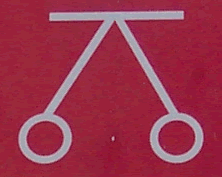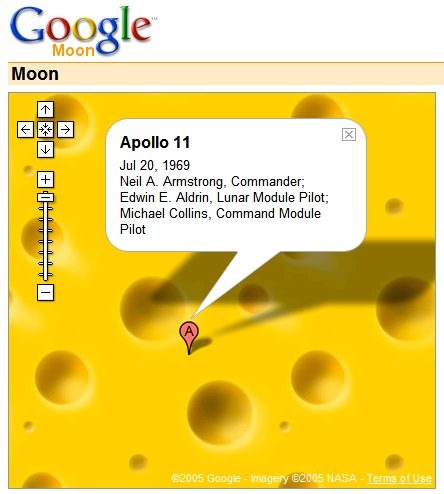Finally a programming language named after me: Felix
Monday, April 30, 2007
How many computer languages do you think there are to date?
Felix is one more. I hope it is a
happy language.
Iconography gone wrong? What is this sign?
Saturday, April 28, 2007

I took this picture 4 years ago in Montreal and I've always wondered what the logo is or what it actually means.
The sign was attached to the side of a
building, but I don't remember what type of establishment it was.
Does it mean anything? Maybe it's just a logo.
I always think of it as a table in roller blades. Or an upside down crab. Or...
When Wii games become chores
Friday, April 27, 2007

We rented
Cooking Mama Cook Off for Gabriel today, and let me tell you video games are not what they used to be.
I like to play games to distract myself from whatever I'm doing, but this cooking game looks like a real chore: players have to peel potatoes, shop onions, fried green peppers, break eggs, make bread from scratch, and then, to top it all off, everything has be cooked into full meals.
Needles to say, I don't like this game but Gabriel seems to like it. Maybe he can start cooking for us :)
Although not all in the game is boring. For example, the Swedish cooking mama has this cute Japanese accent mixed with Swedish goodness: "better than mama," "vanderful," and "awezome" are my favourite sayings now.
I'm just hoping no one in the game publishing world will release the "Cleaning mama clean off" version.
However, if it ever comes out we can use it as punishment. Forget timeouts, they are so 90s. This is 2007 and the era for high tech disciplining is here: "go play your Wii and think about what you did. And don't forget to cut the Wii-grass."
Jack Bauer is better than Peter Petrelli
Wednesday, April 25, 2007
I think Jack Bauer is more than human.
For example, in one day he gets shot at, he gets almost killed by evil doers, he is used as ransom currency, he gets his ribs broken, he gets smacked around by angry Russian guys, etc., etc., and all these without drinking a drop of water or eating a single morsel of food. Furthermore, he's always fine after he says "I'm fine."
In fact, I find it weird that in 24 no one eats nor sleeps. And we are looking at exactly 24 hours in the lives of a bunch of different people doing incredible things.
Yes, I know it's television, but does anyone else find it interesting that the only liquid or food consumed in this whole season is by Morris. In fact, he's not even drinking the boose: "he had a taste of it." Well, at least someone is drinking/eating/regurgitating something.
Greatest goal ever: Lionel Messi or Maradona?
Wednesday, April 18, 2007
You decide.
I think Messi's goal is better. The setting in the World Cup and the King Cup's are miles apart, but the beauty of these two goals can't be denied. And they are so similar. For example:
- Both goals start on their own half.
- Both players take on half of the team.
- Both players are Argentinian.
- Both players are relatively short: Messi is 169 cm; Maradona is 167 cm.
- Both players beat the golie one-on-one.
- Both players gently run to the corner side to celebrate.
- The time it took both players to score is under 10 seconds. Although Maradona's was 1 second faster (give or take a few hundreds of a second; and I timed it from the moment the ball crosses the half line and the instant the ball crosses the goal line).
Messi: 9 seconds.
Maradona: 8 seconds.
Lionel Messi: Barcelona vs Getafe - King's Cup 2007.
Maradona: Argentina vs England - World Cup 1986.
How the Apple logo was designed
Monday, April 16, 2007
I think it's pushing it a bit, but you can see how it evolved to the shiny, metallic futuristic logo.

Speaking of history, I found my
resume linked to some blog that had a character set my browser couldn't display.
I saw the link and I was very curious to find out what it said. So I did a bit of investigating that led me to believe the language was Chinese. I ran the page through altavista's babelfish and I got a rough translation of it.
I think the gist of the blog entry is that someone suggested to the blog's author to revise his/her resume and my page's link was sent as an "example." The entry read that it was around 7 pages long when printed and it had the following line "the thing which had some to exaggerate."
I don't speak Chinese and the translation maybe wrong, but I wish I could point out to the blog's author that my resume is long because it is meant to be a web resume with as many details as possible, but it is very objective and has no embellishments at all (if it is suggesting "exaggeration"). It is a very typical "active verb" type of resume, i.e., I say clearly what I've done and which part of every project I was responsible for.
I think any resume writing workshop will tell you the same thing: clearly state what you worked on and use an active voice.
So when I write: "Developed web tier of Investing section using the Java programming language, following in-house development standards and completing the work under a really tight schedule while working within a large team." I actually did.
Note that I use verbs like
developed,
designed, or
implemented because they clearly convey to the reader what it is I actually did.
Using jobs descriptions doesn't really say much of what your actual involvement is, so clearly stating what you actually did in a resume is actually very useful for anyone reading it.
However, I have a word of caution. The web version of my resume is not meant to be printed because it is way too long. It is more of a work history than a resume. I do have a 2 page resume that people can print for interviews, which I send on request. I would say that the 2 pager is for printing purposes and it could probably be a better example of a regular resume.
Again, a web resume != regular resume.
I use both, but I prefer the web format because it is interactive and it has more details of what I've done (a lot of details). It makes it very easy to determine if any of my experience is useful for someone looking for a software developer/engineer/consultant. Think of it as full disclosure, and it works great during interviews where a laptop is present.
A web resume also allows me to keep it up to date. I can guarantee freshness 24/7/365.
The actual blog link (original):
http://chenyi1976.spaces.live.com/Blog/cns!860D3F8A55672CFF!605.entry.
The translated version:
babelfish's translation.
Do you speak Chinese? What does it really say?
Everything moves
Saturday, April 14, 2007
Do you need to take a break from anything?
Look a the
center of the screen for 20 seconds and then look at something else.
Civil war and the effect on life expectancy: El Salvador
Monday, April 09, 2007
There are some interesting data sets on google's
gapminder flash tool--not many, but enough to play around with it.
Out of curiosity I plotted the US and El Salvador's life expectancy against time.
If you note, between 1972 and 1982, there was a clear decrease in life expectancy in El Salvador--I'd almost say alarming.
(Click on the image to enlarge.)

What happened? Were older people dying younger than expected? Is that what is going on here?
I don't think so.
What the data could actually be telling us is that younger people were dying (or being killed) during the civil war thus pulling the life expectancy average down. It is a
known fact that during the late 70s and early 80s it wasn't uncommon for teenagers to be killed by either side.
It was a sad trend, and clearly one that stopped when the peace accords were signed between both sides in 1992. The question remains: which side won?
I also wanted to see how neighboring countries fared during that period. Take a look:
(Click on the image to enlarge.)

I think the picture speaks for itself.
Google is all about data: gapminder
Before you play with google's latest* acquisition, gapminder, you should see a quick intro of what it is. I think it will make the whole experience of playing with the tool that much more enjoyable and make you like statistics, if you don't already.
The video:
The inventors:
gapminder.orgThe tool:
tools.google.com/gaminder* I shouldn't say latest, as almost 1 month has gone by and google has probably acquired more technology companies up to now.
Windows users don't care or know anything about computers
Sunday, April 08, 2007
Paul Graham wrote recently, in a web essay, that
Microsoft is dead. One his main points is that Apple is having something to do with its demise. Of course, google is in the picture as well, but that is old news.
What I found interesting is a comment he made. I agree that the Mac has made a comeback, but to make this generalization is a bit harsh, I think:
...Apple has come back from the dead in a way that is extremely rare in technology. [2] Their victory is so complete that I'm now surprised when I come across a computer running Windows. Nearly all the people we fund at Y Combinator use Apple laptops. It was the same in the audience at startup school. All the computer people use Macs or Linux now. Windows is for grandmas, like Macs used to be in the 90s. So not only does the desktop no longer matter, no one who cares about computers uses Microsoft's anyway.
I took notice because I like computers and I use an IBM ThinkPad X60s that runs Windows XP. In some way you could say that I "care" about computers. Note that I'm not a passionate zealot. I mean, the computer is just a tool and I will use the one that solves my current problem.
So I'm wondering if the statistical sample he used to make such a general statement is confounded to the fact that the group of people that "care" about computers is larger than the population that apply for Y Combinator money or are interested in the products he sells? I would venture to say...Ah...Maybe...
However, now I know that if I ever want money from Y Combinator I will bring in a Mac to play the part of "cool computer guy in the know," and, most importantly, to prove that I'm not a grandma dressed as a man. Oh, right. I can also install Linux and recompile the kernel while in the middle of my 30 second elevator pitch. That will definitely impress investors...I'm sure...
Update: I can see now that the ploy to write such things in a wessay (web essay) is to
generate traffic. I admit to falling pray as I linked to Graham's blog. To make things even, in the future, I will write an entry called "Google is Dead--And Microsoft Kill it!" and keep track of my traffic increase.
10 Emerging Technologies
Friday, April 06, 2007
Emerging technologies are the type of technologies that change the way we do things. In technology management theory they are called disruptive or radical innovations.
Disruptive because they disrupt the status quo. Disruptive technologies change the way we've been doing things. Think of the type writer and the word processor in the form of software; think of the vacuum tube and transistor. The former, almost disappear. The latter, revolutionized everything around us.
Disruption cannibalizes established markets, but creates new ones out of innovation.
This year
Technology Review Magazine lists 10 emerging technologies. As usual, some of them sound more like predictions and understandably some never make it to the main stream. But I like 2 in particular:
- Peering into Video's Future
I think we've been hearing this for some time now that the internet will crumble on its own weight because of so much data being passed around from user to user, specially video. So Hui Zhang thinks he has a solution by doing P2P video. I'm sure there are differences in how bittorrent works, so there has to be something new there.
- Augmented Reality
This of course will come thanks to the ubiquitousness of cell phones and the powerful CPUs that come embedded in them, in addition to the newer cell technologies and GPS systems being brought to the market.
Imagine pointing your camera, GPS enabled phone to something and information about it will just pop-up on your virtual/real phone world.
This type of technology is not entirely new. You've probably seen it in movies where jet fighters have screens in front of pilot that lock on enemy target and such (I don't think that's fake). The difference here is that it will not cost millions of dollars. It will likely cost a few hundred dollars.
Aside from the coolness of it all, these two emerging technologies are of interest to me because everything will be driven by software. Furthermore, they are essentially new platforms for invention.
The secret of radical innovations is not the fact that they are different or new. What makes emerging technologies main stream is the willingness of a group creators to use them, reshaped them, and combine them with other technologies to add value to an awaiting market. In other words, solve someone's problem.
In these two cases, the value (and markets) will develop from software engineers willing to take a chance to create applications for a new unproven platform.
Everything old is new: Nintendo 8-bit games online
I had a Nintendo system, and it was cool. However, I'm not so much of a hardcore gamer anymore. I play, but only against Gabriel, my 6 year old son.
From time to time, he lets me use his Nintendo Wii to do the fitness test (apparently, I'm 80 years old). But the latest DS game he got for his birthday brought back memories. It's
Mario Bros. for Nintendo DS.
The Nintendo DS is quite a little machine. It has a Wi-Fi card that you can use to connect to the internet and you can also play with other DSs around you, i.e., you need one game and you can share it (play at the same time) with up to 4 other players.
I personally don't wonder anymore why Nintendo is
beating the rest of the gaming console companies on sales. Nintendo gets the gaming industry. The company lost its way around the 16-bit era, but it made a huge come back. Just to give a useless statics: out of the 5 game consoles in the house, 4 are Nintendo.
I played the new Mario Bros. with him, but he wanted it back after 1 minute (selfish little dude), so I went retro on him (well, kind of): I went online and played
Nintendo 8-bit games until I got bored of looking at pixelated characters--the graphics are wonderfully awful.
My favorites are the
flying games--1942, for ever.
By the way, all this games are available online thanks to the Java programming language. Ah Java. It had so much potential to make the OS a thing of past. In truth, we don't really need an operating system at all; all we need is a web browser with an internet connection and we can really do everything we need to do in a computer. I wonder what happened to that vision and why it failed. I'm sure Microsoft played a part, but probably not all of it is Bill's fault.
However, not all was lost: J2EE (or JEE) is still pretty cool.

The problem with blogging
Thursday, April 05, 2007
I want to solve one of the problems with blogging. And I have a rather silly solution.
It's not that blogging has many issues (some people may disagree here), but there is a particular problem I'm interested in: it's the dead link/404 problem.
What I mean with the "404 linking" problem is essentially dead or stale links.
The number 404 is the code given by the HTTP protocol inventors to the "resource not found" error message. So that anyone creating a web server knows the convention of what to do when something is not found and so the browser displays some friendly message to the user, i.e., the dreaded "page not found" error message.
One the major aspects of blogging is linking to other sources on the internet (well, it's the life line of the web), but many sites go out of date quickly so whenever anyone is looking at historical entries in any blog some links are no longer valid.
What's a blogger to do, if he or she wants to keep blog entries relevant for all eternity?
My solution is simple, but I'm not sure if it is breaking copyright laws--may be not; isn't everything on the web free? ;)
What I do is take a snap shot in the form of an image or copy the actual HTML of the original content, hosted locally and
link to it in my blog entry.
I only do this for a few sites that I think are rather important to the context of my entries. Of course, I still have a link to the original site and then clearly mark the local content as an exact copy of the original. My legal defense is that I'm not selling the information, I'm giving full credit for the content, and my site is not a commercial application.
It's more of a referencing exercise. Without references, there would be no new academic work or any new books written, for that matter. So I can use any idea, as crazy as it may be, as long as I give credit where credit is due.
And there are some thing you can copy without permission, for example, in Canada I can reproduce up 10% of any copyrighted material for academic purposes and not break the law. The source of this information was the
WLU librarian on duty a few weeks ago, and I'm assuming he knows what he is talking about--I would recommend to check with your friendly neighborhood librarian to find out what the rules are in your location.
So my solution is not really a solution, but a hack. But I'm trying to design a permanent, fully legal, and open sourced solution. One that will work for everyone and forever.
What's similar out there? In social networking sites such as slashdot or digg, a mirror is used temporarily to solve the
slashdotting or
digged effect.
What these mirror sites do is copy the content locally so web surfers can temporarily visit the mirror sites instead of the original to alleviate the immense load these sites (slashdot or digg) generate when a story makes it to the front page.
This works, and it has actually created a fringe industry out of it, based on advertising revenues. But it's only temporary. There is not enough bandwidth nor incentive to keep a permanent mirror of other sites' content. In addition, it's probably illegal.
Another feasible solution is the
way back machine. But there are two main reasons this won't work: first, who knows when the site will go belly up and stop archiving web sites; second, it only takes snapshots at predetermined dates--it is not really archiving everything published.
To me, the 404 blogging issue need fixing, but my solution of copying the content and offer it locally is not scalable.
So, unless every site on the internet stays up for as long as mine does, which is the ideal, what other solution is there?
I'm hoping to come up with a rather good solution. Although, I'm not working too hard on it.
Does comedy hurt comedians?
Wednesday, April 04, 2007
Donna Bailey Nurse, on a radio show tonight, alluded to the fact that any comedy is dark comedy.
I don't know who she is, and it's unlikely you know who she is, but she made me think about comedy and violence, and in some cases I agree with what she said.
She gave the example of Abbot and Costello with one of them slipping on a banana peel, falling to the floor and whacking his head in the process. Pain is supposed to be funny. The whole act of trying not to fall is funny. I buy that. I think
Cartman's roshambo is hilarious--every time.
If, for example, Abbot (or Costello, as I don't know who is doing the falling) didn't hit his head on the floor and instead got a reward, she argued, the whole act of stepping and slipping on the strategically placed banana peel is not funny anymore.
Very insightful, and yet obvious.
So I think
this is very funny, but I don't think it was meant to be. (Hint: slowly scroll down until you start laughing.)
Google's culture
Tuesday, April 03, 2007
To me, google is one of the most interesting companies today.
It is very successful in the market, it is providing some of the most innovative internet products around, and it is challenging some of the most well established companies in the software industry.
Yet, is has been able to maintain a certain level of funness about it.
Can you imagine seen the image below at any of the bigger software and service companies' site?

It is no secret that technological companies thrive on innovation. However, there comes a point in the history of every growing organization where checks and bounds, in the form rules and processes, have to be put in place.
Some come out of this needed transformation as rigid and formalized organization. They are very efficient at what they do, but the public image changes quite dramatically. In other words, the reason of existence is to do
business (which is not bad, actually).
Google, thanks to its culture, has been able to not change too much. At least in the view of some, for example, myself. Everything I know about the company is what I read and from a friend's experience while visiting the googleplex, but its positioning in my mind is still that of an innovative place to work. (Great marketing, I think.)
It is a very interesting balance of hard core business savvy and technological innovation management that could not have been achieved without the intangible competitive advantage it currently has: its
culture.
"Don't be evil." I'm not sure they are or not, or will not be in the
future. But they are a very successful bunch.